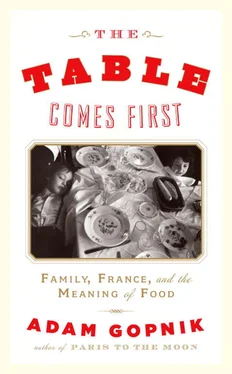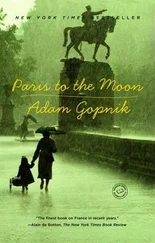Once Parker had established his reputation, the French had to decide whether to fight or to change, and they changed. William Echikson’s heroes, in his book Noble Rot —the story of the ins and outs of the family who own Château d’Yquem but more broadly about post–Parker Bordeaux—are the garagistes and “right bankers,” the winemakers from the wrong bank of the Gironde, who, one by one, are either taking control of old estates or making their own wine in the backyard. Following his heroes from château to château, Echikson gives a strong hint throughout that making good wine is more like making good peanut butter than it is like writing great poetry. Low yields (meaning not too many grapes per hectare), sweet fruit allowed to ripen as long as possible (there is always pressure on growers to harvest early, because of the threat of a late rain or an early frost), no stems, minimal “handling”—the formula is pretty simple. Wine is good grape juice gone bad, and, as many of the new French winemakers seem to suggest under their breath, there is something to be said for the Australian system where grapes are collected from around the country, sorted through, and fermented in great big well-controlled vats, and terroir be damned.
Yet the reader, even one with Parkerized tastes, may, on reflection, find the French objections to Parker’s lists and numbers more complicated than many of the critics allow. The debate is not about whether the numbers are right but whether it is right to have numbers. Everyone agrees that Parker is, on his own terms, a completely honest scorer; but by scoring he intends to serve the consumer, and makes the wine drinker into one. What consumers want is reliable beverage products, and, once wine is a reliable beverage product, it isn’t quite wine.
Demanding absolute excellence on an unchanging universal numerical scale is not, after all, our usual measure of sensual engagement. A man who makes love to fifty-some women and then publishes a list in which each one gets a numerical grade would not be called a lady’s man. He would be called a cad. And that, more or less, is how a good many Frenchmen think of Parker: they don’t doubt his credentials; they question his character. A real man likes moles and frailties; a real man marries his wine, as he marries his wife, and sees her through the thin spots. Being impatient with the tannins in a Margaux is like being impatient with the lines on your wife’s face. They are what makes it a marriage rather than a paid assignation.
For one of the defining characteristics of many French terroirs is not to make very good wine. To alter that is to put them in the beverage business. No one says this, exactly—but when you are handed a glass of thin and astringent country wine in France and asked to admire it for its character, there is a reasonable point in which its character does consist in its having some. The French connoisseur believes that, with his glass of turpentiney Gascon wine, he is in a truer relation to history and reality than the American searching for his jammy high-scorers. I wouldn’t actually drink like this, but I understand it.
Of course, if the ladies were offering their favors at forty dollars a go, it would seem fair for somebody to grade them, and that is, more or less, what Parker’s defenders say: a product that is being bought and sold should be subject to the market discipline of all other things that are bought and sold, and all the guff about earth and history and ineffable singularity is just a way of avoiding giving the customer what he ought to get for his money.
Well, what does make wine taste bad or good? Is there really a standard, or a way to agree on one? Within the heart of every wine drinker there is the suspicion that no one really knows. I was once at a dinner in Paris, seated by a big “name” in wine tasting, and, along about the third bottle, she leaned in and announced, half gaily and half conspiratorially, “You know, it’s really all about the same.” Of course, she didn’t actually believe that—but I also had the sense that in another way she did believe it, that she was confiding something significant about her own profession. She didn’t mean that it all tastes the same—obviously, it doesn’t—but that, stripped away from its elaborate rituals, the distinctions that her livelihood depends on would be a lot muddier and mixed up.
The French cognitive psychologist Frédéric Brochet has done pioneering, if disconcerting, work on this subject. It was Brochet who first discovered that if you simply put red food coloring in white wine even experienced drinkers can’t tell it from red wine. What we see shapes what we smell. But his work goes further than that. In another study, he offered, at a week’s interval to a constant group, the same mediocre wine, first labeling it a vin de table and then as a grand cru . Predictably, the subjects’ tasting notes conformed more closely to the label than to what was “really” there. Nor did anyone seem to detect that it was the same wine with a new label. Once again, the frame frames. We lean on what we see, what we read, to create a context for what we think we taste and smell.
Nor does “expertise” seem to alter this effect very profoundly. Studying tasting notes from forty-four professionals at a wine exposition, Brochet discovered that “when a taster experiences a particular wine, the words they use to describe it are those that they link to this sort of wine.” That is, even the expert tastes what he expects to taste, and says what he has said before. If you called the last Côtes du Rhône “rich and peppery,” then that is what you will say about the next one; the words make the wine before the wine produces the words. What’s more, and it’s a slightly scary thought, Brochet showed that when you look at MRIs of the brains of wine connoisseurs who use different pet phrases to describe their wines, different areas of the brain light up—they are actually experiencing different things. To the degree that any “fakery” is going on, it is entirely sincere self-delusion.
According to scientists who study smell and taste, that’s just the beginning: the duplicity reaches from the organizing mind deep into the experiencing senses themselves. Rachel Herz, a professor of psychology at Brown, conducts research into the effects of “frames”—context—on the perception of smells. (Wine tasters are “noses” first of all.) Smells, she reports, “are so malleable when it comes to verbal context that when reasonable verbal information is available it will override and even replace the olfactory information.” The effect is pronounced when the smells are, in some way, ambiguous—tell people that they’re smelling vomit, and they’ll smell vomit; tell them that the same smell is Parmesan cheese, and they’ll smell Parmesan cheese. With wine, the most basic verbal categories (it comes from France, it comes from America, it’s cheap, it’s expensive) seem to be able to throw even an educated nose off track. The illusions, Herz suggests, “work the way, in a familiar illusion, arrowheads either going in or feathering out extend or shorten straight lines. Word labels on smells are the same kind of context effect, and these context effects are markedly more powerful with nose sensations than they are with other kinds.”
To make things worse, the nose turns out to have the shortest memory of all the sense organs. A simple experiment, Herz suggests, shows just how powerful nose amnesia is: Think of a familiar tune—say, “Yesterday.” Now think of a familiar picture—say, the Mona Lisa . Now think of the smell of a tuna-fish sandwich. You can do the last, of course, but where the other sensory memories are strong, clear, and sharp, the tuna-fish sandwich smell is general and vague. What the nose knows, in effect, is not much, and that soon forgotten. (Wine lovers protest violently when they are told this, but their protest, from the academic point of view, is a bit like the protest of eyewitnesses who are sure they saw what they say they saw, even if they didn’t.) Yet to accept this is not to say that the elaborate language of wine evaluation is necessarily or even remotely phony. It is exactly because smells are so labile and hard to grasp that they need more help from words than other sensations. When it comes to wine, we are all like early-Alzheimer’s patients who have to be coaxed into memory and appreciation. (“Remember, Dad—that’s the woman we saw on the beach at Wellfleet.” “Oh, yes! Her.”)
Читать дальше












